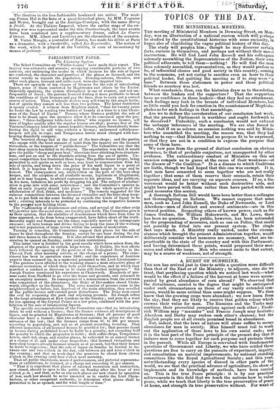TOPICS OF THE DAY.
THE MINISTERIAL :MEETING.
THE meeting of Ministerial Members in Downing Street, on Mon. day, was an illustration of a national custom which will perhaps be studied by the constitutional historian with some curiosity, in hopes also of elucidating the vague political history of this ay. The study will perplex him; though he may discover certain facts, curious in themselves and perhaps not without their moral instruction. He will find Lord John Raissell and his colleagues solemnly assembling the Representatives of the Nation, their own political adherents, to tell them—nothing! Ile will find the men thus solemnly assembled, representatives, as they would profess to be, of influential classes and good society in this country, coming to the summons, yet not caring to sacrifice even an hour to their political leader, but quitting the meeting as if to stop 'were "a bore." Between those statesmen in power and these political friends no courtesy was lost.
What conclusion, then, can the historian draw as to the relation between the leaders and the supporters ? That the supporters have no confidence in those leaders—that they feel no attachment. Such feelings may lurk in the breasts of individual Members, but as little could you look for emotion in the countenance of Mephisto- pheles as for such feelings in that assemblage. -
Are we to deduce the corroboration of our conclusion last week, that the present Parliament is worthless and ought forthwith to be dissolved? Unluckily, such a conclusion would not exhaust the unhappy inferences of the meeting. We are also forced to infer, that if on so solemn an occasion nothing was said by Minis- ters who assembled the meeting, the reason was, that they had nothing to say—that Ministers had no purpose fit to be expressed, or that they are not in a condition to express the. purpose that some of them have.
We now pass from the ground of distinct conclusion on obvious premises, to that of probable conjecture, not unsupported by other evidence. The extraordinary conduct of -Ministers -on this set occasion compels us to guess at the cause Of- their weakness—at the disease of "the Coalition." It is a disease to which Coalitions are liable, though we had hoped that this one was exempt. It is, that men have consented to seem together who are not really together ; that some of them reserve their counsels, retain their separate ideas and are carrying on separate courses. If so a Go- vernment would be better without such destructive aids, and might have parted with them rather than have parted with some good measures this session.
A thorough Reform Bill would have been better than a colleague not thoroughgoing on Reform. We cannot suppose that some men, such as Lord John Russell, the Duke of Newcastle, or Laid Aberdeen—men of distinct and avowed sentiments—are in this severed position. Respecting others of known power, such as Sir James Graham, Sir William Molesworth, and Mr. Lowe, there has been no question. The public, however, has been astounded by the propounding of measures, such as one on Police, that could not possibly be fitted into our present system. The single fact says much. A Ministry really united; under the circum- stances which brought the present Administration together, would. deliberately consider what measures are neoestiary, what are im- practicable in the state of the country and with this Parliament; and having determined these points, would propound their mea- sures and abide the issue. Men who cannot unite to that extent, may be a source of weakness, not of strength.


























 Previous page
Previous page